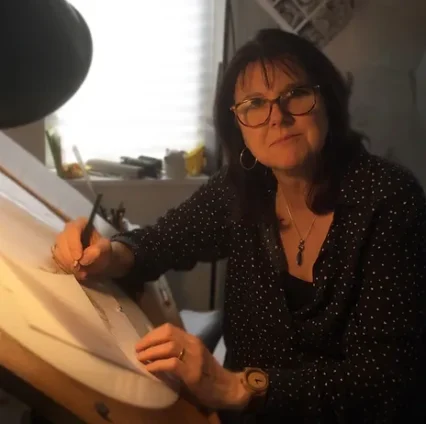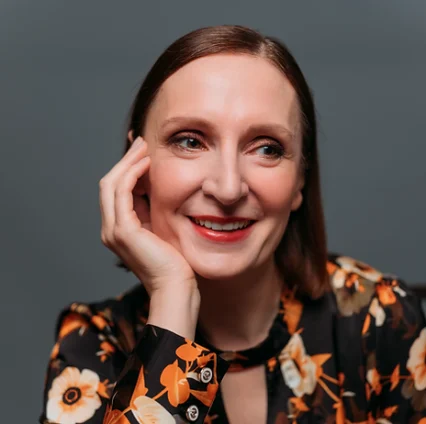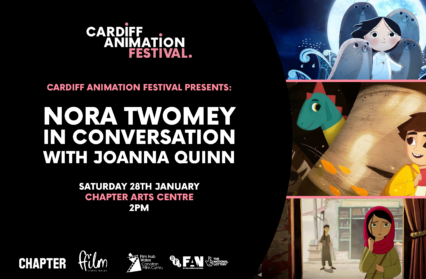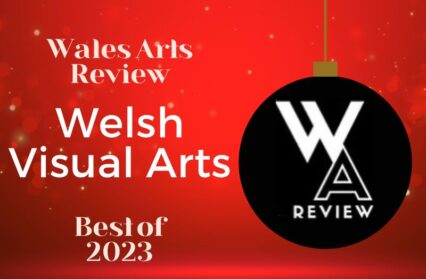Jonathan Macho was at the Cardiff Animation Festival to hear animator, screen-writer and Academy Award nominated director Nora Twomey in conversation with Cardiff’s animation legend, Joanna Quinn.
Animation is collaboration. Despite almost all of us being raised on cartoons (and some of us never letting them go), it can be easy to forget just how many ink-blotted fingers touch them on their journeys from page to screen. Maybe it’s because we rarely get to put a face to the work; maybe it’s because the medium remains an undervalued mainstay of our entertainment landscape. Whatever the reason, it was almost surreal to find myself surrounded by a community of animators in a crowded Sinema 1 in Chapter Arts Centre on a chilly Saturday afternoon. From the rows before and behind me came snatches of conversations about storyboarding, upcoming projects and artistic challenges. It was a very cool place to be, and I wasn’t the only one excited to eavesdrop. Everyone was keen to listen in on the chat soon to start on the stage.

Lauren Orme, the director of Cardiff Animation Festival, was fizzing with enthusiasm as she introduced her heroes to the assembled festival goers, and her admiration was clearly not only shared by the crowd, but by the headliners themselves. Minutes into their chat, there could be no doubt that Nora Twomey and Joanna Quinn hold the utmost admiration for each other. Nora Twomey is the twice Oscar nominated director of such modern classics as The Secret of Kells, The Breadwinner and most recently My Father’s Dragon, which was screened for a packed house of fans and families as part of Chapter’s wonderful Free Family Films initiative earlier that day. Joanna Quinn’s work is similarly acclaimed, with numerous beloved short films released between 1987 and 2021. Joanna has two Oscar nominations under her belt as well, but was keen to let us know that wasn’t the only thing they had in common: Nora worked for many years in a pea factory in Ireland, and so did Joanna’s dad. We knew we were in for an honest afternoon when she described his favourite way of passing the time on shift: passing gas in the cold storage room and leaving it for unsuspecting managers to stumble across and gag. In between fits of giggles, Nora assured us she spent the long hours thinking up stories instead. Her starting point, every time: ‘There once was a girl…’
And that’s another thing this session made clear: animation doesn’t just come from a community, but also a community of women, many more than a layperson might realise. As well as the two directors on the stage and Lauren leading the festival, Mia Rose Goddard, Marcia Rojas and Bryony Evans, three artists who worked on My Father’s Dragon, were also in attendance, and were singled out for well-earned applause. The crowd itself was packed with female animators and animation students, and several young girls had brought their parents along too. The animators of the future? We can only hope. And it stretched far beyond Sinema 1. As the conversation progressed, we returned again and again to those who have helped Nora over the course of her life and who push her onwards today, the majority of whom were women too.

There were Nora’s mother and sister, who let her drop out of a school that was not working for her and encouraged her to pursue her artistic ambitions after far too long at the aforementioned pea factory, sending her off to college to meet the community who would change her life. Then there were the teams she works with at the innovative Irish studio she co-founded, Cartoon Saloon, including the screenwriter on My Father’s Dragon, Meg LeFauve, who was also Oscar nominated for the outstanding Inside Out, and Naomi Calvo Morales, who was brought in as a character designer on the film. My Father’s Dragon is itself based on a book by 99-year-old Ruth Stiles Gannett, who has 7 daughters who have followed the film’s production every step of the way. Even Angelina Jolie merited a mention, as an executive productive on The Breadwinner, and after a brief swoon over the star it was clear her true value to Nora was her willingness to collaborate, to play her part in making the story as good as it can be.
To stay with The Breadwinner for a moment, the story of a young girl living in Kabul under the Taliban is a perfect way of demonstrating how far this community has spread and how important it can be. If we can hope the girls in attendance were inspired by My Father’s Dragon, then we know The Breadwinner means a great deal to a number of Afghan women. Nora and Joanna sang the praises of a community of Afghan animators who have spoken to them about the film, including the incredible Sara Barackzay, who founded an animation school in Kabul and is currently the inaugural animator in residence at the University of British Columbia. When asked why she felt the story was hers to tell, a visibly emotional Nora returned to her mother and the time she spent as a midwife in Ireland in the ‘60s, sharing her disgust at the way women out of wedlock were treated at that time. Even then, she tempered her outrage at the squashing of another person’s human rights with a firm belief in what art can do in response – shine a light on what’s wrong, but ‘always lean into the hope.’
That response typified a very open conversation, and Joanna said as much at the end: Nora clearly values honesty in both her life and storytelling. While I can wax lyrical about the magic of the medium endlessly (and I defy anyone to watch a film by Cartoon Saloon and not do the same), animation is not a stable industry. Nora pointed out that working in their studio’s offices would grant you more job security than being an animator with 20 years’ experience on their books. They’re attempting to change that, but it’s clearly an uphill battle. Her long-term goal is to get more parents and carers working in the studio, to foster a supportive working environment that allows people to be imperfect because in the end that leads to better stories. When asked what her favourite part of the process is, she said the teamwork, and that clearly comes across in how she cares for her team. The results speak for themselves. Animation is collaboration, after all.
‘Creativity is meant to be generous, meant to be shared,’ she said in response to one of the audience’s questions. It was generous of her to share her creativity with all of us, and I think we were all very grateful that she did.
Details of events taking place as part of the Cardiff Animation Festival are available here.
You can follow Nora’s work via her Twitter page, where she posts regularly as @nora877











